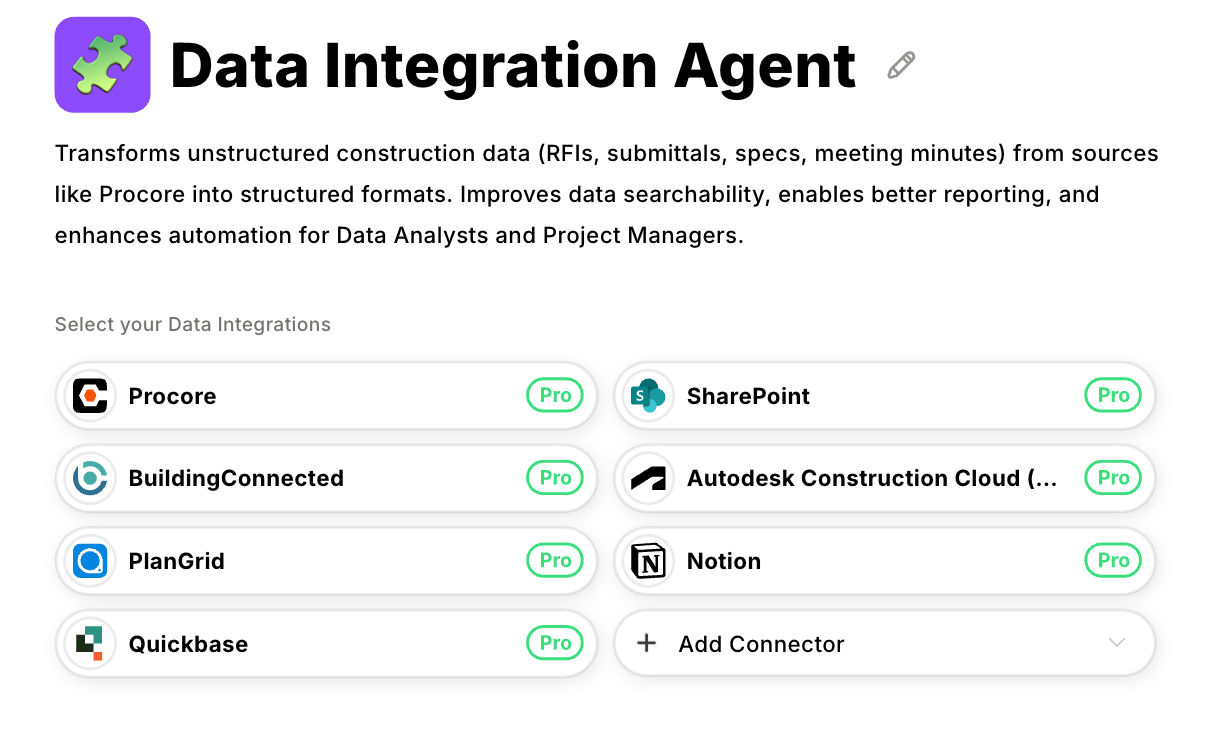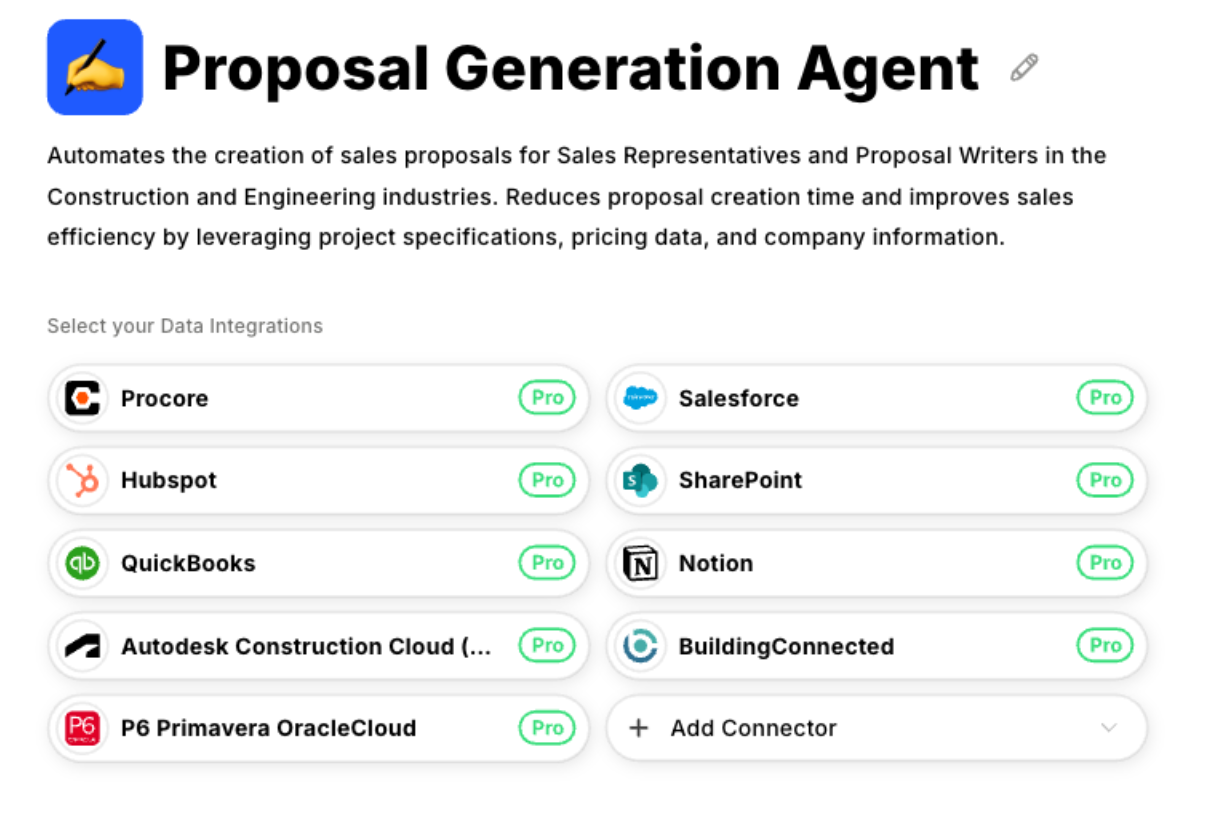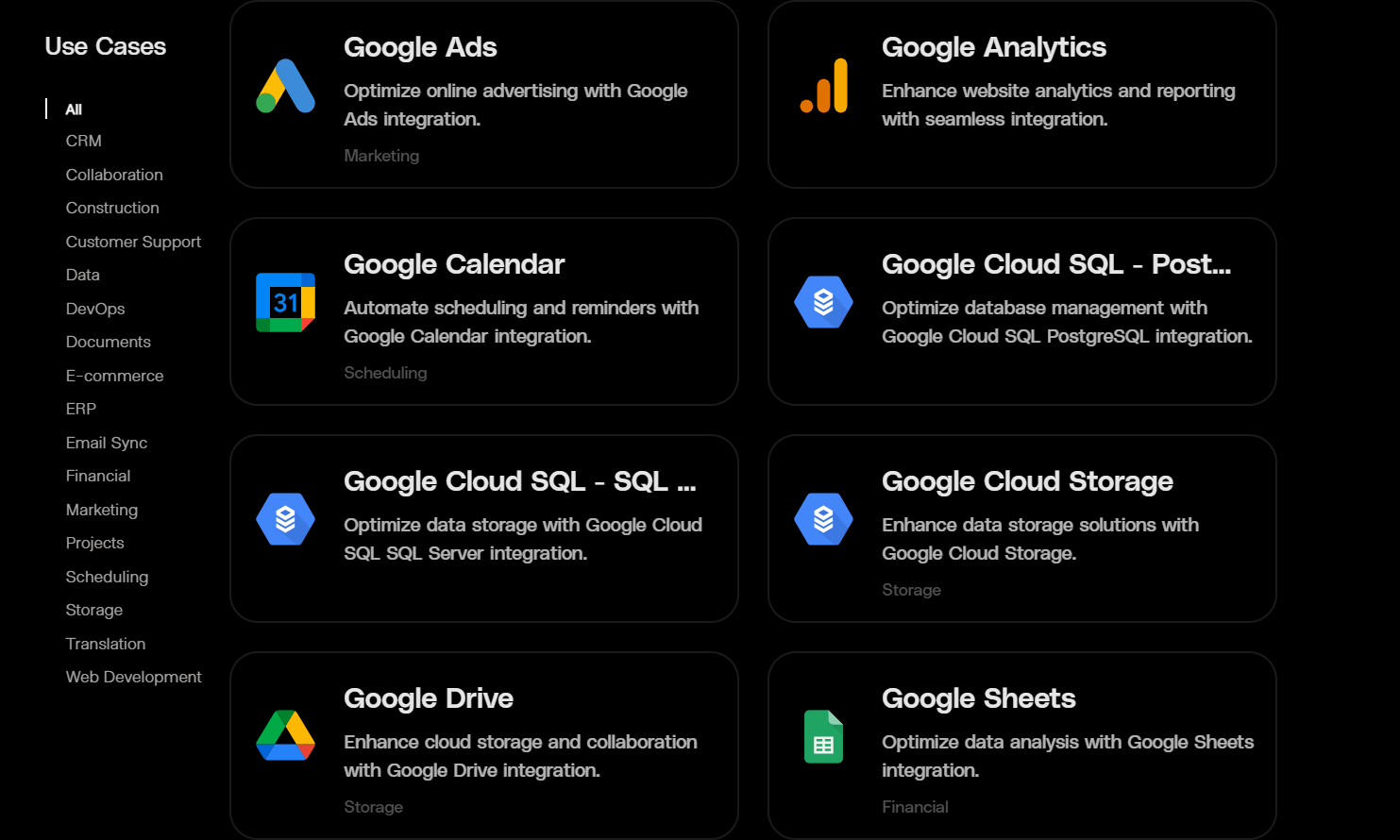Discover how AI agents transform proposal writing. Learn to automate tasks, enhance accuracy, and focus on strategic work. Revolutionize your process today.
This article was last updated on November 25, 2025.
Project managers spend weeks reconstructing proposal details before crews can mobilize, with non-standardized documents forcing teams to rebuild scope, schedule, and resource lists from scratch. This delay creates gaps between sales commitments and field capabilities, leading to costly mid-project corrections when requirements aren't properly captured.
AI agents eliminate this bottleneck by processing RFPs with semantic chunking during proposal development. They extract executable requirements and structure them into actionable lists while you're negotiating contract terms. Construction teams receive structured handoff packages for immediate project setup, transforming proposal documents into operational intelligence during the bidding process itself.
Below, we'll show how AI agents extract requirements during proposal writing, validate what operations can actually deliver before bids go out, and generate the scope and spec databases your project managers need to start building on day one.
Eliminating Project Delays Caused by Manual Document Processing
Manual extraction from complex RFPs demands days of processing time, limiting teams to roughly three tenders per employee daily. This creates a documented drain across construction teams still working with paper-heavy workflows. Beyond time loss, the biggest cost comes from reduced predictability and execution readiness.
Teams using AI agents can increase the number of tenders processed per employee daily, drastically cutting analysis time and freeing capacity for strategic work. Automated risk scoring and requirement matching help firms catch issues during bidding rather than during execution, preventing unbudgeted labor costs and schedule compression.
Datagrid's specialized AI agents can process construction documents simultaneously, extracting requirements from RFPs, specifications, and technical drawings while integrating with your existing project management systems.

How AI Agents Bridge Proposal Writing and Project Execution
Deadlines slip after the bid celebration because of what's buried in the proposal itself—uncaptured requirements, fuzzy scope, or promises no one validated against capacity. AI agents fix that disconnect by working on the proposal the same way a superintendent works on a jobsite: reading every drawing, flagging risks, and handing over a site-ready plan.
RFP Analysis That Extracts Executable Requirements
An intelligent agent ingests every page of an RFP—spec sheets, drawings, and annexes—and divides the document into chunks that preserve the original hierarchy.
This parsing keeps the link between a schedule constraint hidden in Section 3.2 and the material spec tucked away in Appendix F, something traditional keyword search can't manage. Instead of scrolling through 200-page PDFs, you receive a structured list of technical standards, deliverables, and schedule milestones ready for estimating and scheduling.
Automate Proposal Assembly with Proven Response Libraries
Once requirements are extracted, the agent pulls approved language from your content library and assembles a draft that already looks like a scope matrix, not marketing prose. The AI agent maintains a library of your best proposal responses (called "Q&A banking"), which stores successful answers to common RFP questions.
When you receive a new RFP, the agent finds similar questions from previous proposals and suggests proven responses, maintaining consistent voice and formatting while eliminating manual copying and pasting.
The agent understands context and automatically cross-references each promise with the relevant specification paragraph, ensuring every commitment ties back to a source.
Validate Resource Availability Before Submitting Proposals
A second agent tests whether the shiny draft can really be built. It compares the proposed schedule against live resource calendars, flags crane conflicts, and checks equipment availability.
If you promise night shifts but the labor database shows zero certified operators after 6 p.m., the system highlights the mismatch before the bid goes out. Risk scoring models that surface both legal gaps and technical pitfalls let you negotiate or no-bid with data instead of gut feel.
Fewer "how are we going to do that?" moments after contract award.
Prevent Compliance Issues with Automated Risk Detection
Compliance work rarely wins the job, but it often decides whether you keep it. An intelligent compliance agent scans every clause, drawing on rule sets learned from thousands of tenders to spot missing references, contradictory specs, or outdated safety language.
Automated quality checking helps catch omissions that humans might miss during document review, giving proposal teams a chance to correct errors before submission and shielding field crews from potential change-order issues during project execution.
Create Project-Ready Handoff Packages Automatically
The final handoff no longer involves emailing a PDF and hoping operations reads it.
As soon as the bid is submitted, the agent exports a package that your project management system can ingest directly:
- Scope matrices mapped to WBS codes
- Deliverable trackers pre-filled with due dates
- Spec databases linked to drawings
- Resource requirement lists tagged to cost codes
Automated report generation ensures every stakeholder—estimating, procurement, field supervision—opens the project on day one with the same source of truth.
You move from "win then figure out" to "figure out while you win," shaving weeks off mobilization and preserving the margin you fought for in the bid room.
Datagrid's AI agents generate these structured handoff packages automatically during proposal development, connecting to project management platforms like Procore and pulling from your centralized content libraries to ensure every project starts with complete operational intelligence.

Implementing AI Agents Across Proposal and Operations Workflows
You don't need to replace existing systems to see real impact from intelligent agents. Roll them out in four phases to validate value early, capture institutional knowledge, and feed structured data directly into the tools your teams already use.
Phase 1: Start with RFP Analysis and Requirements Extraction
Test whether an agent can read the same messy PDFs your project managers fight with daily. Upload historical bids and let the system process them. Track two metrics: percentage of requirements captured versus manual baseline, and time saved on project setup. When extraction accuracy consistently hits 95%, move to phase two.
Phase 2: Build Operational Content Libraries
High-quality extractions only work if the agent can answer RFP questions with vetted language. Centralize what lives in your veterans' heads: equipment specs, safety procedures, typical crew schedules. A smart Q&A bank learns these patterns and surfaces the best response automatically.
Structure each entry with a clear prompt, approved answer, and tags for discipline, phase, and compliance code. Teams stop hunting across drives and start reviewing pre-filled sections that already match organizational standards.
Phase 3: Integrate with Project Management Systems
Connect the agent's outputs to the software that actually runs your jobs. Instead of exporting PDFs, configure the system to generate JSON packages containing scope items, deliverables, and risk flags.
Datagrid integrates with 100+ business systems through unified APIs, eliminating custom point-to-point connections between proposal tools and project management platforms. This unified data layer means AI agents can access approved content, validate against operational capacity, and deliver structured project data without requiring extensive IT development work.

Most platforms have connection points, so integration is often a matter of mapping data, but practical implementation typically requires developer-level IT expertise.
Real-time collaborative review means estimators, schedulers, and field supervisors comment on the same living document instead of trading email attachments. The handoff lands in your project management tool already tagged, categorized, and ready for scheduling—no retyping, no copy-paste errors.
Phase 4: Validate Operational Feasibility During Proposals
With data flowing both ways, enable the agent to compare proposed schedules and resource plans against current capacity. If the crane you promise is already booked or the crew is over-allocated, the system flags conflicts before bid submission.
Transparent dashboards turn these alerts into go/no-go conversations that include operations leadership, closing the historical gap between pursuit and delivery. This feedback loop sharpens your bid strategy and improves win rates because every proposal is grounded in executable reality rather than optimistic spreadsheets.
By automating document processing, construction teams can eliminate the manual bottlenecks that delay project mobilization and ensure accurate information flows seamlessly from bid development to field operations.
Turn Proposals Into Operational Intelligence
Datagrid eliminates the proposal-to-execution gap that delays project mobilization and erodes margins:
- Automated RFP Processing: AI agents extract requirements, specifications, and deliverables from complex bid documents simultaneously, creating structured databases that project teams use for immediate setup instead of spending weeks reconstructing commitments from proposal narratives.
- Operational Feasibility Validation: Validate proposed schedules, resource commitments, and technical specifications against actual capacity during proposal development, preventing the post-award surprises that cause schedule pressure and margin erosion.
- Structured Project Handoff Packages: Generate scope matrices, deliverable trackers, and specification databases automatically during the bidding process, enabling project managers to start execution on day one with complete visibility into commitments and requirements.
- Unified System Integration: Connect AI agents to your existing project management platforms and content libraries through unified APIs, eliminating custom integration complexity while maintaining enterprise security standards.
- Scalable Operations Capacity: Process more proposals and mobilize projects faster without proportionally scaling project management headcount, turning proposal volume growth into revenue growth instead of operational bottlenecks.
Create free account to build executable project plans with Datagrid's AI agents.













